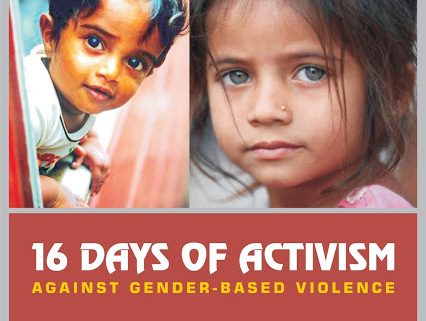|
 Dear Hon’ble Prime Minister, Dear Hon’ble Prime Minister,
We, the undersigned women’s organizations and other concerned groups, convey our greetings on the occasion of 8th March, Women’s Day. This day has been celebrated for more than a hundred years to commemorate the women’s movement’s struggles for equality, justice and peace across almost all countries of the world.
On this memorable occasion, we are aware that you and your colleagues will be making speeches and statements to indicate how much this nation values the contribution of its women to the country’s progress. We expect that many will praise women as mothers, caring family members and hard workers; we hope some will acknowledge the diverse struggles of women everywhere in securing freedom from violence and ensuring peace.
We appreciate your earlier efforts to promote the value of daughters and encourage education for the girl child. We therefore look forward to more announcements from you this year that will indicate just how much this nation, and your government, shows appreciation for the women of this country. We would especially like to draw your attention to women’s work that produces food, goods, services, and care for the household as well as children who will be the future workforce of India; yet women’s care work continues to remain invisible, unsupported and unshared. You must have noticed how everywhere women work simultaneously in fields, forests, water bodies, and at home; providing water, fuel, fodder, cooking, cleaning, caring of children, sick, elderly, yet they are often unpaid and sometimes get much lesser wages than men on farms, work sites, factories, and markets. In fact unpaid care and household work by women, even though it is ten times as much as men, remains unrecognized and unaccounted for in the System of National Accounts (SNA).
The McKinsey report (The Power of Parity, 2015) points out how the gender gap in employment is exacerbated by unfair conditions for working women who become pregnant. In India 95% women workers are in the informal and unorganized sector and do not receive any wage compensation during pregnancy and after childbirth, although we expect them to rest, gain weight, improve their own health and then provide the baby with exclusive breastfeeding for six months. The Economic Survey of India 2016 (Ministry of Finance, Government of India) points out that ‘42.2% Indian women begin pregnancy too thin and do not gain enough weight during pregnancy’ and recommends that ‘some of the highest economic returns to public investment in human capital in India lie in maternal and early life health and nutrition interventions.’
Sir, on the occasion of Women’s Day we would earnestly request you to announce some substantial entitlements for women that would show very tangibly how much this country values women’s contribution to society and their families: as workers, as mothers and as valuable members of communities.
I. At the very least, we expect your leadership in immediate implementation of the National Food Security Act 2013, within which:
a. The Central Scheme for Maternity Entitlements should immediately be up-scaled from its pilot phase into at least 200 high-priority districts especially including those with a larger proportion of tribal (ST) population. The universal guarantee of at least Rs. 6000/- is only to be read as a beginning, and it should subsequently be rationalised as wage compensation.
b. Maternity entitlements in all sectors must be universal and unconditional, and not linked to the number of children or age of the woman, as that is fundamentally discriminatory to both women and children.
c. Supplementary nutrition through locally prepared foods – preferably hot cooked meals to be supplied to all pregnant and lactating women at the local Angawadi centre. The money invested for such a meal is highly inadequate currently under the ICDS program, leading to poor quality and quantity of the supplementary nutrition,
d. The public distribution system must provide universal access to 10 kgs of cereals, I kg of pulses and 1 kg of oil rations under the NFSA.
II. We also hope within a short time to see:
a. The progressive realization of nine months of maternity leave (three months before childbirth to six months after) with full compensation of wages for all women, calculated at least according to minimum wages at prevalent rates. This revision of the Maternity Benefits Act (1961) should recognize women’s work in all spheres, markets, domestic, for care and reproduction and subsistence; and guarantee maternity entitlements to all pregnant women, adoptive parent(s), surrogate mothers etc without discrimination.
b. Large scale campaigns that call upon men to increase their contribution to care work and domestic chores, and reduce the burden on women.
c. Creche and breastfeeding facilities at every work place and community (through Anganwadi-cum-creches) to be made mandatory to ensure women can continue to work and care for the infant.
d. Financial resources for maternity entitlements and crèches should come from all economic activities in the country as a state obligation to ensure entitlements and services, since reproduction is a social function which benefits the family, society and the nation.
Sir, on the occasion of Women’s Day, while paying compliments and appreciating the role of women, we are sure the government would want to change the embarrassingly inadequate allocation of 400 crores for Maternity Entitlements against the requirement of 15000 crore annually. We urge you to translate rhetoric into action by allocating resources for social security in maternity, and acknowledging unpaid reproductive work done by women in this country, even as you greet them on this Women’s Day.
|
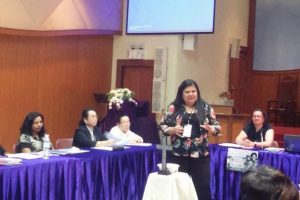 (Ms Moumita Biswas sharing about CEDAW during Women Building Peace, Preventing Violence and Transforming Our World’ Consultation of CCA)
(Ms Moumita Biswas sharing about CEDAW during Women Building Peace, Preventing Violence and Transforming Our World’ Consultation of CCA)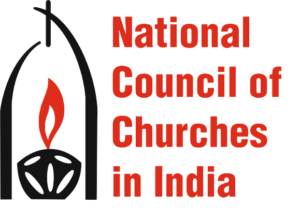
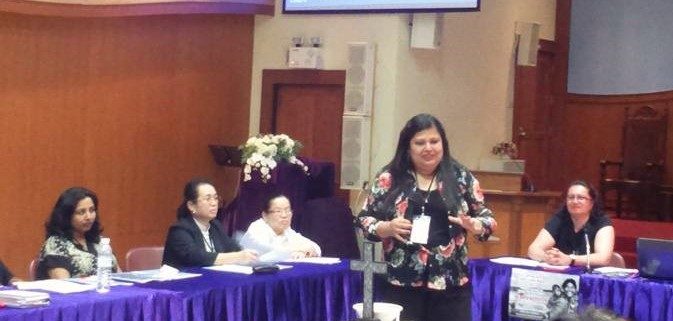


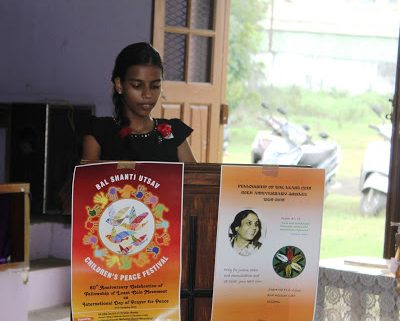

 Nurturing Church Women’s Spirituality for Justice and Peace and promoting World Day of Prayer (WDP) is one of the priority focuses of All India Council of Christian Women ( AICCW). WDP is a global, ecumenical movement of Christian women joined together to observe a common day of prayer each year on the first Friday of March. The Motto of WDP is
Nurturing Church Women’s Spirituality for Justice and Peace and promoting World Day of Prayer (WDP) is one of the priority focuses of All India Council of Christian Women ( AICCW). WDP is a global, ecumenical movement of Christian women joined together to observe a common day of prayer each year on the first Friday of March. The Motto of WDP is
 Dear Hon’ble Prime Minister,
Dear Hon’ble Prime Minister,
 March is a very special month for women around the world. In the month of March, ‘World Day of Prayer’ is observed and ‘International Women’s Day’ is commemorated. During this period churches, women’s fellowships and organizations in India like every year engage in various advocacy activities to promote Women’s ‘Human Rights’, end gender-based violence, and celebrate the power of women as agents of transformation. IWD helps us to recognize the role of women as salt and leaven and weavers justice and peace.
March is a very special month for women around the world. In the month of March, ‘World Day of Prayer’ is observed and ‘International Women’s Day’ is commemorated. During this period churches, women’s fellowships and organizations in India like every year engage in various advocacy activities to promote Women’s ‘Human Rights’, end gender-based violence, and celebrate the power of women as agents of transformation. IWD helps us to recognize the role of women as salt and leaven and weavers justice and peace.
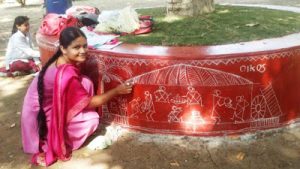 The National Council of Churches Quadrennial Assembly is at the threshold. The theme of the Assembly is “Towards Just and Inclusive Communities”. NCCI is mobilizing and inviting churches and communities to participate in this pilgrimage and celebration. Various Pre Assemblies or Forums are being organized. “Our aim is to creatively engage communities, churches and people to share their stories and contributions and join us in our pilgrimage to build just and inclusive communities. Building just and inclusive communities also calls for just relationships with mother earth” states Rev Dr Roger Gaikwad, General Secretary of NCCI. Ten young women dalit and tribal artists were invited to share their notion of just and inclusive communities through traditional Warli art form by painting murals embracing walls around the trees in NCCI campus. These young women are from indigenous and dalit background and are trainees from adopted slum communities of Church of North India – Social Service Institute (CNISSI) of Nagpur Diocese. Church of North India is member Church of NCCI.
The National Council of Churches Quadrennial Assembly is at the threshold. The theme of the Assembly is “Towards Just and Inclusive Communities”. NCCI is mobilizing and inviting churches and communities to participate in this pilgrimage and celebration. Various Pre Assemblies or Forums are being organized. “Our aim is to creatively engage communities, churches and people to share their stories and contributions and join us in our pilgrimage to build just and inclusive communities. Building just and inclusive communities also calls for just relationships with mother earth” states Rev Dr Roger Gaikwad, General Secretary of NCCI. Ten young women dalit and tribal artists were invited to share their notion of just and inclusive communities through traditional Warli art form by painting murals embracing walls around the trees in NCCI campus. These young women are from indigenous and dalit background and are trainees from adopted slum communities of Church of North India – Social Service Institute (CNISSI) of Nagpur Diocese. Church of North India is member Church of NCCI.


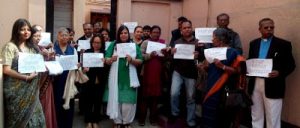 l Consultation on Ecumenical Advocacy to End Human Trafficking and Sexual Slavery was organized by All India Council of Christian Women ( AICCW) in Partnership with Lutheran World Service India Trust on 10th
l Consultation on Ecumenical Advocacy to End Human Trafficking and Sexual Slavery was organized by All India Council of Christian Women ( AICCW) in Partnership with Lutheran World Service India Trust on 10th